Читать книгу The Wisdom of the East: Buddhist Scriptures - Anonymous - Страница 7
Chapter III.
he Four Signs
ОглавлениеThe subject of the following legend also forms one of the episodes of the Lalita Vistara, and has found its way into English literature. It forms the leading motive of the medieval morality play Everyman, where Death is thus addressed by God:
Go thou to Everyman,
And shewe hym in my name
A pylgrymage he must on hym take,
Whiche he in no wyse may escape,
And that he brynge with him a sure rekenynge
Without delay or ony taryenge.
The Lalita Vistara was put into a Christian dress as the story of Barlaam and Josaphat, and it occurs in a Greek version (probably from the Arabic) among the writings of John of Damascus (eighth century). From this source the story with its episodes became a popular literary subject during the Middle Ages. The story of the caskets in Shakesspeare's Merchant of Venice, found earlier also in Gower, is from the same work.
On a certain day the Bodhisatta desired to go into the park. He called his charioteer, and said, "Yoke the chariot." "Very good," he replied, and adorning a great and most excellent chariot with all adornments, yoked the four royal Sindh horses of the colour of white lotus-petals, and informed the Bodhisatta. The Bodhisatta ascended the chariot, which was like a throne of the gods, and went towards the park. The gods thought, "The time for the enlightenment of prince Siddhattha is near, we will show him a previous sign," and they caused a son of the gods to appear, infirm with age, broken-toothed, grey-haired, bent, with crooked body, leaning on a staff, trembling, and showed him. But only the Bodhisatta and the charioteer saw him. Then the Bodhisatta asked the charioteer in the way recorded in the Mahāpadāna discourse, "Friend, who is that man, even his hair is not like that of others?" And on hearing his reply said, "Woe upon birth, since through it old age must come to those who are born," and with troubled heart he returned from thence and entered the palace. The king asked, "Why does my son return so quickly?" They said, "Your Majesty, he has seen an old man, and he is going to retire from the world." "Why will you kill me? Prepare stage-plays for my son quickly; if he obtains happiness, he will not think of retiring from the world," said the king. And he prepared a guard, and set them in all directions to the distance of half a league.
Again on a certain day, as the Bodhisatta was going to the park, he saw a diseased man set there by the gods, and having asked in the same way he returned with troubled heart and entered the palace. The king also inquired as before said, and again prepared a guard and put them on all sides to the distance of three-quarters of a league. Again another day when going to the park he saw a dead body put there by the gods, and having asked in the same way he returned again with troubled heart to the palace. The king also inquired as before said, and again prepared a guard and put them on all sides to the distance of a league. Again another day when going to the park he saw put there by the gods a hermit carefully and duly dressed. "Friend, who is this?" he asked the charioteer. As it was not the time of the appearance of a Buddha, the charioteer knew nothing of a hermit or the virtues of a hermit, but through the power of the gods he replied, "Your Highness, this is a hermit," and described a hermit's virtues. The Bodhisatta was delighted with the thought of renunciation, and that day he went on through the park. But the reciters of the Dīgha (Collection of long discourses) say that he went and saw the four signs all on one day. (Jāt. Introd. I. 58 ff.)
